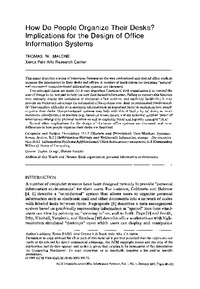How do people organize their desks?Implications for the Design of Office Information Systems
Thomas W. Malone
Erstpublikation in: ACM Transactions on Office Systems, 1(1):99-112
Publikationsdatum:
|
 |
 Diese Seite wurde seit 4 Jahren inhaltlich nicht mehr aktualisiert.
Unter Umständen ist sie nicht mehr aktuell.
Diese Seite wurde seit 4 Jahren inhaltlich nicht mehr aktualisiert.
Unter Umständen ist sie nicht mehr aktuell.
 Zusammenfassungen
Zusammenfassungen
This paper describes a series of interviews focusing on the way professional and clerical office workers
organize the information in their desks and offices. A number of implications for designing "natural"
and convenient computer-based information systems are discussed.
Two principal claims are made: (1) A very important function of desk organization is to remind the user of things to do, not just to help the user find desired information. Failing to support this function may seriously impair the usefulness of electronic office systems, and explicitly facilitating it may provide an important advantage for automated office systems over their nonautomated predecessors. (2) The cognitive difficulty of categorizing information is an important factor in explaining how people organize their desks. Computer-based systems may help with this difficulty by (a) doing as much automatic classification as possible (e.g., based on access dates}, and (b) including untitled "piles" of information arranged by physical location as well as explicitly titled and logically arranged "files." Several other implications for the design of electronic office systems are discussed, and some differences in how people organize their desks are described.
Von Thomas W. Malone im Text How do people organize their desks? (1983) Two principal claims are made: (1) A very important function of desk organization is to remind the user of things to do, not just to help the user find desired information. Failing to support this function may seriously impair the usefulness of electronic office systems, and explicitly facilitating it may provide an important advantage for automated office systems over their nonautomated predecessors. (2) The cognitive difficulty of categorizing information is an important factor in explaining how people organize their desks. Computer-based systems may help with this difficulty by (a) doing as much automatic classification as possible (e.g., based on access dates}, and (b) including untitled "piles" of information arranged by physical location as well as explicitly titled and logically arranged "files." Several other implications for the design of electronic office systems are discussed, and some differences in how people organize their desks are described.
 Dieser Text erwähnt ...
Dieser Text erwähnt ...
 Zitationsgraph
Zitationsgraph
 Zitationsgraph (Beta-Test mit vis.js)
Zitationsgraph (Beta-Test mit vis.js)
 8 Erwähnungen
8 Erwähnungen 
- Stuff I've seen - a system for personal information retrieval and re-use (Susan Dumais, Edward Cutrell, JJ Cadiz, Gavin Jancke, Raman Sarin, Daniel C. Robbins)


- Time-Machine Computing - A Time-centric Approach for the Information Environment (Jun Rekimoto) (1999)


- TimeScape - A Time Machine for the Desktop Environment (Jun Rekimoto) (1999)


- Stuff Goes into the Computer and Doesn’t Come Out - A Cross-tool Study of Personal Information Management (Richard Boardman, M Angela Sasse) (2004)


- Beyond the Desktop Metaphor - Designing Integrated Digital Work Environments (V. Kaptelinin, M. Czerwinski) (2006)

- 1. The Desktop Methaphor and New Uses of Technology - Introduction
- 2. Beyond Lifestreams - The Inevitable Demise of the Desktop Metaphor (Eric Freeman, David Gelernter)
- 7. Supporting Activity in Desktop and Ubiquitous Computing (Stephen Voida, Elizabeth D. Mynatt, Blair MacIntyre)

- 9. Users’ Theories on the Desktop Metaphor - or why we should seek metaphor-free interfaces (Pamela Ravasio, Vincent Tscherter)
 Anderswo finden
Anderswo finden
 Volltext dieses Dokuments
Volltext dieses Dokuments
 |  How do people organize their desks?: Artikel als Volltext ( How do people organize their desks?: Artikel als Volltext ( : :  , 288 kByte; , 288 kByte;  : :  2021-03-21) 2021-03-21) |
 Anderswo suchen
Anderswo suchen 
 Beat und dieser Text
Beat und dieser Text
Beat war Co-Leiter des ICT-Kompetenzzentrums TOP während er Dieser Text ins Biblionetz aufgenommen hat. Die bisher letzte Bearbeitung erfolgte während seiner Zeit am Institut für Medien und Schule. Beat besitzt kein physisches, aber ein digitales Exemplar. Eine digitale Version ist auf dem Internet verfügbar (s.o.). Aufgrund der wenigen Einträge im Biblionetz scheint er es nicht wirklich gelesen zu haben. Es gibt bisher auch nur wenige Objekte im Biblionetz, die dieses Werk zitieren.










 Procrastination
Procrastination User/Benutzer
User/Benutzer

 Biblionetz-History
Biblionetz-History